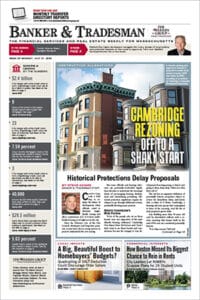
From customer protection to the basic foundations of the real estate economy, a major brokerage’s move to grow its off-market listing business could have a big impact on the Massachusetts housing market. iStock illustration
Compass’ major foray off-market listings, has reignited debate around the National Association of Realtor’s anti-private listings policy.
The national brokerage’s move is part of the launch of a new client portal, called Compass One. The company describes it as the first-ever all-in-one client dashboard allows buyers to review their home search collection and review personalized market analyses.
But it also gives clients access Compass-exclusive inventory, as well as non-Compass exclusives, raising hackles among local agents who see the move as anti-competitive.
“In some cases, it can be good for sellers, but not in every case,” said Andrew Haigney, broker-owner at the Batterymarch Group in Boston. “For the market as a whole? No, because what they’re doing is they’re really pulling a shade on transparency. They really don’t want you to have the information. They want to be the MLS.”
Move Shields Info from Buyers
Compass says it’s giving customers access to exclusives via Compass One as part of a new three-phase marketing strategy for homes its agents represent.
The first phase of this strategy is to have a listing shared among Compass agents as exclusive instead of immediately listing it on a multiple listing service. Then, a home is publicly listed on Compass’ website and only after is it submitted to an MLS.
Compass describes the move as allowing information such as days on market or price cuts to remain private.
A Compass spokesperson did not directly respond to questions about the brokerage’s private listings initiative, and only told Banker & Tradesman that the dashboard and the marketing strategy are separate initiatives.
Jonathan Miller, president and CEO of appraisal firm Miller Samuel and a noted real estate commentator, said that, in his view, Compass is seeking to hide information from consumers.
“They’re pushing a private network,” he said. “If they win, it means less-informed consumers and probably a lot of litigation, because if a buyer did not understand that the property had been on the market for three times what the normal property was, then they may come to the conclusion that they overpaid.”
NAR’s anti-private listings policy, called Clear Cooperation, is only a few years old. But historically most agents have used their local MLS service as the common, public marketplace for home listings, even if the MLSs are, like the New York Stock Exchange, privately owned.
The idea of private, or “pocket” listings is often greeted with anger by many traditional agents and brokers.
“I think any company that’s proposing doing away with any kind of cooperation entirely, that strategy seems to be self-serving for the company versus the broader consumer,” said Coldwell Banker New England President Pauline Bennett.
But Compass’ initiative could pose a threat to any brokerage’s lifeblood: their ability to attract and retain agents, whose commissions are usually a brokerage’s biggest revenue source. Having a private network, Miller said, could make agents at other brokerages feel like they are missing out on opportunities
“If they go down this trail, it’s going to actually help them recruit agents,” Haigney, the Boston broker, said.

It’s still an open question whether homes sold via private listings count as arm’s-length sales. If they spread, experts say, it would affect municipal property taxes. iStock illustration
Municipal Taxes Could Be Affected
As Compass continues to push its exclusive listings, it also raises questions about whether municipal assessors can use homes sold this way as comparables when evaluating a property – potentially throwing a wrench into the system that funds local schools, fire departments and more.
The key phrase when assessing homes is a “qualified arm’s-length sale.” This essentially means the sale price reflects its true value because a willing buyer and seller agreed on it via the open market, influenced by no other considerations.
Kathleen Costello, executive director of the Massachusetts Association of Assessing Officers noted that familiar relationships, such as a deal between a next-door neighbor or a family-member, can exclude a sale from being a qualified arms-length sale.
A home needs to be advertised on the open market in order to be considered a qualified sale, Costello added.
When asked if having homes exclusively in a company’s portal would count as a qualified arms-length sale, Costello stated that various factors had to be considered.
“That’s a tough question,” she said. “I hate to say this, but it’s the appraiser’s favorite statement: It depends. Are they going to put a sign on the front of the house, and are people going to be driving by and see, ‘Oh, this house is for sale’? That’s going to make a difference.”
David Murphy, board chair of Massachusetts’ main multiple listings service MLS PIN, said that private listings also raise questions about whether homes were able to reach their true value.
“The definition of ‘market value’ contains the requirement that the property received reasonable exposure to the open market,” he said. “What is the assurance that that property has floated to its real and true value, and that anyone who wanted to make an offer on it has had the opportunity to do that?”

Sam Minton
Could Other Brokerages Follow Suit?
The Massachusetts housing market is defined by continued price increases and a lack of inventory. According to data from The Warren Group, publisher of Banker & Tradesman, the median sale price for a single-family home in the commonwealth increased 59.7 percent from 2018 to 2024, ending last year at $615,000.
Ryan Castle, CEO of the Cape Cod & Islands Association of Realtors, said that any initiative that sees less buyers on the market will only hurt the overall housing market.
“I think that the real estate market right now is best served by having the most amount of buyers to buy a house” he said. “And I say that not to drive up price, but an effort to provide variety out there. If a brokerage has an institutional investor as their as their client and every listing they take, the institutional investor only knows about it and [is] buying it, I don’t see how that’s healthy for a healthy market down the line.”
But the issue of private listings isn’t going away. Bennett, the New England head of Coldwell Banker, said that if private listings gain popularity, her company is ready to go in whatever direction the market goes in.
“We as a company, ponder this issue,” she said. “We keep the consumer in the forefront of our minds while preparing for whatever changes may come. We’ve got a lot of companies that participate in bringing inventory to the market, and for many years, we’ve believed that we’ve done the best work for both our buyers and our sellers by promoting equitable access for everyone. But also knowing that if for some reason, things go a different way, you know, we feel pretty good about our position as a large listing holder throughout the country”






